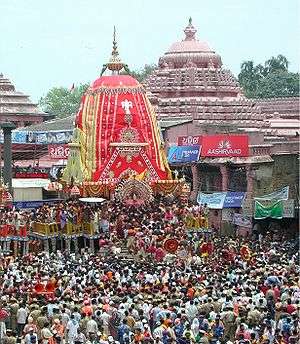Juggernaut
A juggernaut (/ˈdʒʌɡərnɔːt/ (![]()



Overview
The figurative sense of the word has origins in mechanics comparable to figurative uses of steamroller or battering ram to mean something overwhelming. Its ground in social behavior is similar to that of bandwagon, but with overtones of devotional sacrifice. Its British English meaning of a large heavy truck[2] or articulated lorry dates from the second half of the twentieth century.[3]
The word is derived from the Sanskrit/Odia Jagannātha (Devanagari जगन्नाथ, Odia ଜଗନ୍ନାଥ) "world-lord", combining jagat ("world") and nātha ("lord"), which is one of the names of Krishna found in the Sanskrit epics.[4]
The English loanword juggernaut in the sense of "a huge wagon bearing an image of a Hindu god" is from the seventeenth century, inspired by the Jagannatha Temple in Puri, Odisha (Orissa), which has the Ratha Yatra ("chariot procession"), an annual procession of chariots carrying the murtis (statues) of Jagannātha, Subhadrā, and Balabhadra.
The first European description of this festival is found in a thirteenth-century account by the Franciscan monk and missionary Odoric of Pordenone, who describes Hindus, as a religious sacrifice, casting themselves under the wheels of these huge chariots and being crushed to death. Odoric's description was later taken up and elaborated upon in the popular fourteenth-century Travels of John Mandeville.[5] Others have suggested more prosaically that the deaths, if any, were accidental and caused by the press of the crowd and the general commotion.[6]
The term is used in Charles Dickens's The Life and Adventures of Martin Chuzzlewit, published in 1844, to describe the love-lorn sentiments of Mr. Augustus Moddle, the 'youngest gentleman' at Mrs. Todgers's: "He often informed Mrs. Togders that the sun had set upon him; that the billows had rolled over him; that the Car of Juggernaut had crushed him; and also that the deadly Upass tree of Java had blighted him."
The figurative sense of the English word, with the idea of "something that demands blind devotion or merciless sacrifice" became common in the mid-nineteenth century. For example, it was used to describe the out-of-control character Hyde in Robert Louis Stevenson's The Strange Case of Dr. Jekyll and Mr. Hyde.[7] Other notable writers to have used the word this way range from H. G. Wells and Longfellow[3] to Joe Klein. Bill Wilson in Twelve Steps and Twelve Traditions of Alcoholics Anonymous describes "self-sufficiency" in society at large as being a "bone-crushing juggernaut whose final achievement is ruin". To the contrary, Mark Twain (autobiography, vol 2), describes Juggernaut as the kindest of gods. Any pretensions to rank or caste do not exist within its temple.
Many speakers and writers apply the term to a large machine, or collectively to a team or group of people working together (such as a highly successful sports team or corporation), or even a growing political movement led by a charismatic leader—and it often bears an association with being crushingly destructive.
See also
References
- Jones, Daniel (2003) [1917], Peter Roach; James Hartmann; Jane Setter (eds.), English Pronouncing Dictionary, Cambridge: Cambridge University Press, ISBN 3-12-539683-2
- "Definition of Juggernaut". Merriam-Webster. Retrieved 7 April 2013.
- "Juggernaut". Oxford English Dictionary (3rd ed.). Oxford University Press. September 2005. (Subscription or UK public library membership required.)
- "djuggernaut". Dictionary.com.
- Folker Reichert, Asien und Europa im Mittelalter, p. 353.
- Rath Yatra: The Chariot Festival of Puri, India
- Jane Lilienfeld "Review of Thomas Reed's The Transforming Draught: Jekyll and Hyde, Robert Louis Stevenson and the Victorian Alcohol debate", Victorian Studies, Vol. 50 Issue 1, 2007.
External links
| Look up juggernaut in Wiktionary, the free dictionary. |